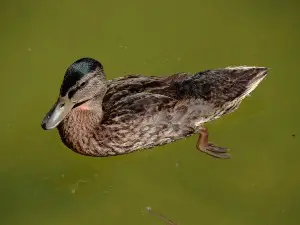
Ducks may seem like very robust birds, but there are in fact a variety of ailments that can affect these birds, your ducks can even die of these ailments if left unattended.
Knowing this, if you realize that there is something wrong with your bird, if the bird starts sneezing, you’d be right to be concerned. This article looks into why your duck is sneezing
Table of Contents
Duck sneezing:
Sneezing on occasion is actually quite normal for ducks and other birds, but, if your bird is sneezing on a consistent basis, especially if the sneezing is accompanied by nasal discharge, then you can assume that there is an issue and something wrong with your bird.
Here are reasons why your duck may be sneezing and what to do:
Irritation:
If your bird’s airways get irritated then this can cause the bird to start sneezing.
Both ducks and humans can be sensitive to irritants. Irritants that may irritate your bird’s lungs include air fresheners, pine or cedar bedding on the floor, and dusty bedding.
Once the birds inhale the irritants, the irritants will get into the bird’s airways and cause the birds to start sneezing.
The sneezing can start as soon as the ducks are exposed to the irritants.
Treatment options:
Treatment involves removing the irritants from the bird’s environment.
Remove any air fresheners from the bird’s quarters and consider using bedding like aspen shavings or large flake pine shavings in your duck houses.
Aspen shavings are recommended as you can find hypoallergenic aspen shavings, these are great for people with allergies, plus they have no dust which is great for you and your birds.
Large flake pine shavings are also a great choice as they are cheap, abundant and they have antimicrobial properties, plus they are gentle on your duck’s feet.
Respiratory disease:
Another reason why your duck may be sneezing when breathing may be because the bird has a respiratory disease.
Your birds can suffer from a variety of respiratory diseases that can occur in either the upper or lower respiratory system of ducks.
The upper respiratory system includes the sinuses, trachea ad nasal passages. The lower respiratory system includes the air sacs, the abdomen, the lungs, and the insides of some of the bird’s bones.
There are a variety of respiratory diseases that your ducks can get and these diseases can cause the bird to develop a variety of symptoms and sneezing is one of them.
Other signs of respiratory disease in ducks, other than sneezing, include coughing, wheezing, watery eyes, nasal discharge, lethargy, the inability to perch, ruffled feathers, and the bird keeping its eyes closed.
Possible infections that your duck may be suffering from include bacterial infections, fungal infections, viral infections parasitic infections
Treatment options:
Trying to diagnose the bird of its respiratory disease yourself won’t always be fruitful, which is why it is recommended that you take the bird to the vet to be examined and diagnosed.
Keeping the bird isolated and giving it access to its own food and water is recommended if you can’t immediately get the bird to the vet. This will keep the other birds safe should the disease be contagious.
Once at the vet, you can give them a history of the illness in the bird, this includes the bird’s overall behavior, other signs of illness from the bird, and how long the bird has been sick, this can help the vet diagnose the bird.
The vet may also perform lab tests and do a physical exam on the bird as a way to try to figure out what is wrong with the bird.
Once the vet pinpoints the problem they will suggest medication that will be appropriate for the bird.
If the infection is bacterial then antibiotics will be prescribed. Probiotics will also be prescribed to bring good bacteria into your bird’s body after the antibiotics wipe out the good, and bad, bacteria from your bird’s body.
The bird may be given antifungal medication if the disease is caused by a fungus. If a parasite caused the disease then the bird will be given antiparasitic medication.
If the bird is in really bad shape then the bird may need to be hospitalized and fluids may need to be given to the bird through an IV
If you enjoyed this article then you may also be interested in other chicken related articles. Here are some articles that you may be interested in: Duck Breathing Fast, Why Do Ducks Change Colour?, Duck Breathing Loud, Duck Bill Colour Change, Duck Breathing Heavy

